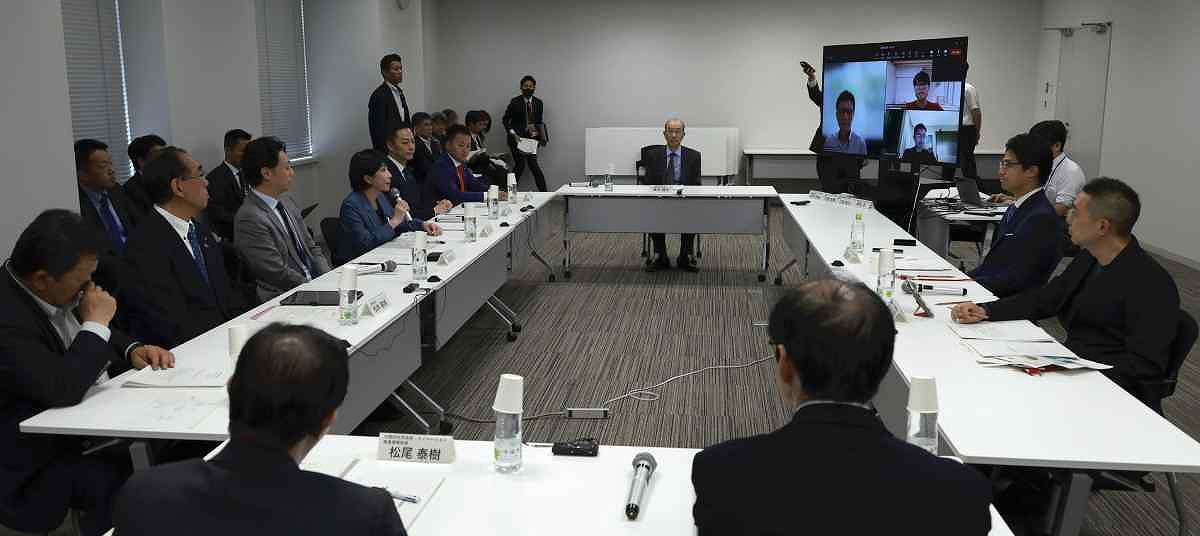Discussions on AI Legislation in Japan Finally Boot Up; Govt Aims to Match Legislative Progress Abroad

The government’s AI Strategy Council holds a meeting in Tokyo on Wednesday.
20:00 JST, May 23, 2024
The government has finally taken a major step toward considering legislation to regulate generative artificial intelligence.
The move follows efforts in Europe and the United States to strengthen such regulations. However, as deep-rooted caution about the issue remains within some quarters of the government, specific plans have yet to take shape. Among the many pressing challenges facing such legislation is whether it can put the brakes on uncontrolled AI use in high-risk fields such as elections and security.
At a press conference Wednesday, Chief Cabinet Secretary Yoshimasa Hayashi indicated his intention to advance discussions on the legislation while keeping a close eye on the situation unfolding in other countries.
“We’ll push ahead with AI regulations and promoting AI usage in an integrated manner,” Hayashi said. “We intend to discuss issues, including whether it is necessary to develop domestic laws, based on developments around the world.”
The government’s approach to AI regulation, including the guidelines for AI developers established in April, has so far relied on the voluntary efforts of developers **to ensure the technology is used safely**. The consideration of legislation marks a change in direction.
Some harmful effects of rapidly developing generative AI have become apparent, such as the dissemination of misinformation, human rights violations and misuse for criminal purposes. Consequently, moves to craft legal regulations have been gaining momentum overseas. The European Union on Tuesday approved the Artificial Intelligence Act, which comprehensively regulates AI’s development and effective use. The United States even requires developers of powerful AI systems to share certain information with the U.S. government.
“There is a trend internationally toward enacting legislation, and the government decided Japan also should consider this,” a senior government official told The Yomiuri Shimbun.
Fears investment could ebb
In the basic policies presented at the meeting on Wednesday, major AI developers that have the potential to impact massively on people’s daily lives were squarely in mind as the targets of any potential legislation. The policies said the regulations “should avoid” small developers and other such businesses. The plan aimed to prevent regulations from stifling the technological innovations of domestic AI developers, many of which are small start-ups.
The U.S. tech giants such as Alphabet Inc., Apple Inc., Meta Platforms, Inc., Amazon.com Inc. and Microsoft Corp. would be front and center as subject to the legislation. On the other hand, U.S. IT titans and other large companies have announced a string of development investments in Japan. Some government officials remain reluctant to compile tighter regulations due to concerns they could “weaken the appetite” of these companies to invest money in Japan.
The European Union’s AI Act will be fully in place in 2026. The Japanese government’s current position is that action is needed at home, too. “Japan mustn’t stand out by itself on this issue,” a close aide to Prime Minister Fumio Kishida said. “The government will watch the situation in Europe and the United States and take its time to consider what steps to take.”
High-risk fields
Some Liberal Democratic Party members have compiled the outline of a draft basic law for promoting responsible AI. In addition to requiring AI developers above a certain size to report to the government on compliance, the draft law would allow government authorities to conduct on-site inspections in the event of a serious incident. The draft also specifies that penalties would be imposed for violations of the law. The draft’s content is similar to regulations adopted in the United States.
“We must avoid a situation in which the U.S. government is notified when a problem occurs, but the Japanese government isn’t,” said House of Representatives member Masaaki Taira, who led discussions on the draft law.
The European Union’s AI law prohibits the use of AI in high-risk fields, such as assessing an individual’s credit rating and cognitive behavioral manipulation that could encourage criminal acts. These issues also could become topics for consideration during upcoming discussions in Japan.
Tatsuya Kurosaka, a project associate professor at Keio University and an expert on AI policy, applauded the government’s decision to start discussing AI legislation but pointed out that discussions were urgently needed for high-risk fields.
“The government should quickly implement regulations on the use of AI in security, elections and elementary school education,” Kurosaka said.
Top Articles in Politics
-

Japan PM Takaichi’s Cabinet Resigns en Masse
-

Sanae Takaichi Elected Prime Minister of Japan; Keeps All Cabinet Appointees from Previous Term
-

Japan’s Govt to Submit Road Map for Growth Strategy in March, PM Takaichi to Announce in Upcoming Policy Speech
-

LDP Wins Landslide Victory, Secures Single-party Majority; Ruling Coalition with JIP Poised to Secure Over 300 seats (UPDATE 1)
-

LDP Wins Historic Landslide Victory
JN ACCESS RANKING
-

Producer Behind Pop Group XG Arrested for Cocaine Possession
-

Japan PM Takaichi’s Cabinet Resigns en Masse
-

Man Infected with Measles Reportedly Dined at Restaurant in Tokyo Station
-

Israeli Ambassador to Japan Speaks about Japan’s Role in the Reconstruction of Gaza
-

Videos Plagiarized, Reposted with False Subtitles Claiming ‘Ryukyu Belongs to China’; Anti-China False Information Also Posted in Japan

























